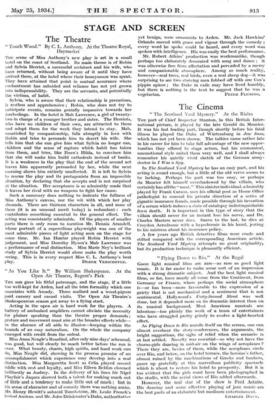" As You Like It." By William Shakespeare. At the
Open Air Theatre, Regent's Park THE sun gave his fitful patronage, and the stage, if a little too well-kept for Arden, had all the trim formality which one associates with Arcady. Three mallard and a wood-pigeon paid cursory and casual visits. The Open Air Theatre's Shakespearean season got away to a flying start.
Acting in the open air is hard work for the players. A battery of ambushed amplifiers cannot obviate the necessity for plainer speaking than the theatre proper demands ; gesture and movement must aim at the broader effects while— in the absence of all aids to illusion—keeping within the bounds of an easy naturalism. On the whole the company emerged with credit from the ordeal.
Miss Anna Neagle's Rosalind, after only nine days' rehearsal, was good, but will clearly be much better before the run is over. What beauty, charm, high spirits, and hard work can do, Miss Neagle did, showing in the process promise of an accomplishment which experience may develop into a real distinction. Miss Margaretha Scott as Celia played second fiddle with zest and loyalty, and Miss Eileen Beldon downed brilliantly as Audrey. In the delivery of his lines Sir Nigel Playfair's Jaques showed both a talent for making much out of little and a tendency to make little out of much but in his sense of character and of comedy there was nothing amiss. Mr. Henry Hewitt's subacid. TouchstOne, Mr. Leslie French's hrrieal Amiens. and Mr. John Drinkwater's Duke, authoritathm- yet benign, were ornaments to Arden. Mr. Jack Hawkins' Orlando moved with grace and vigour through the comedy ; every word he spoke could be heard, and every word was spoken with intelligence. His was easily the best performance.
Mr. Robert Atkins' production was workmanlike, though perhaps too elaborately decorated with song and dance ; it was otherwise free from affectation and pervaded by a merry and companionable atmosphere. Among so much reality, however—real trees, real birds, even a real sheep dog—it was surprising to see two starving men fobbed off with one Cox's pippin apiece ; the Duke in exile may have lived humbly, but there is nothing in the text to suggest that he was a
















































 Previous page
Previous page